
In this newsletter:
QUBES News
- Featured QUBES Partner of the Month: Quantitative Biology at Community Colleges (QB@CC)
- QUBES Near You: Members of Team QUBES Invite you to connect with them at these upcoming conferences.
- Writing a proposal for an education project? Learn how the QUBES infrastructure can support your project.
News from QUBES Partners
- Cohort 4 Biology Teaching Assistant Project (BioTAP) Scholar applications are LIVE!
- Contribute to the 2020 ASMCUE Program!
- Come to Open Science Skills Training in 2020.
- Save the date for the 2020 HITS summer workshop at UNC-Chapel Hill, June 1-3, 2020
- Serve as an NSF IUSE Reviewer!
- Job Opportunity: Inclusive science post-doc position at the University of Missouri, Columbia
- Apply for the HHMI BioInteractive Ambassador Academy.
- Pilot test BLAST, Genome Browser, or RNA-Seq lessons from the Genomics Education Alliance (GEA).
Featured QUBES Partner of the Month: Quantitative Biology at Community Colleges (QB@CC)
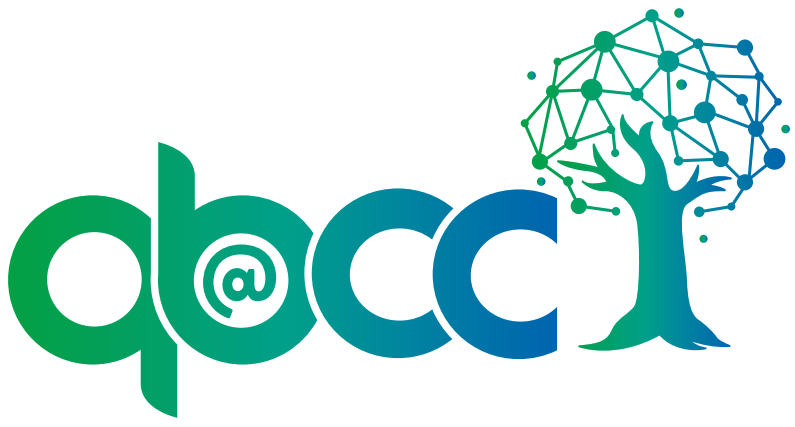
QUBES partners with organizations and groups who are doing exciting things in undergraduate education. Every so often we select one of these partners to feature in our newsletter to raise awareness of their work, celebrate recent activities, and announce upcoming opportunities.
This month’s featured QUBES partner is Quantitative Biology at Community Colleges (QB@CC), a new NSF supported project designed to bring together life sciences and mathematics faculty from community colleges to integrate more quantitative concepts and skills in life science courses.
There are a several ways QUBES users can engage with QB@CC:
Join the Launch Activities this Spring Semester.
The QB@CC community will be launched with an in person meeting February 27-29, hosted by the National Institute of Mathematical and Biological Synthesis (NIMBioS) at the University of Tennessee, Knoxville, followed by team based development of educational materials appropriate for a wide range of quantitative biology skills from basic dilutions to working with big data. Following the in person meeting, participants will form teams of 3-5 that include both life sciences and mathematics faculty. Groups will work together virtually for twelve weeks to identify and adapt existing OERs on topics in any life science course where quantitative biology could be more effectively integrated. Adaptations will be published on QUBESHub and OERCommons. If this sounds exciting to you, apply to join QB@CC for a semester of community-driven development of quantitative biology OERs. Full and part time life science and mathematics faculty at community colleges are invited to apply. Interdisciplinary institutional teams are encouraged to apply. Hurry! The application deadline has been extended to Jan 2, 2020. Visit the conference website for more information.
Can’t participate this Spring? Watch for upcoming opportunities!
Stay tuned for QB@CC Incubators.
QB@CC will be partnering with QUBES to support faculty developing quantitative biology educational materials through Incubators - virtual, facilitated, workspaces. In an Incubator, small groups of faculty work together to generate and beta test educational materials while receiving support from peers and expert mentors. If you are interested in receiving information about upcoming QB@CC incubators, please continue to watch the QB@CC community page and subscribe to the QUBES Newsletter.
Join a professional development opportunity in Fall 2020.
QB@CC will be offering professional development for faculty interested in incorporating more quantitative biology in their life sciences courses. In Fall 2020, small groups of faculty will meet in Faculty Mentoring Networks to incorporate the new educational materials developed in the Spring Incubators. Faculty Mentoring Networks (FMNs) provide sustained support through mentors and peers for faculty implementing new educational materials or pedagogies. If you are interested in receiving information about upcoming QB@CC FMNs, please continue to watch the QB@CC community page and subscribe to the QUBES Newsletter.
QUBES Near You: Members of Team QUBES Invite you to connect with them at these upcoming conferences.
In QUBES Near You, we let you know which upcoming conferences the members of the QUBES team will be attending in case you’d like to connect with them. Members of Team QUBES are always looking to meet others who have a passion for quantitative biology education. See where they’ll be this spring... and don’t forget to ask them for a QUBES sticker!
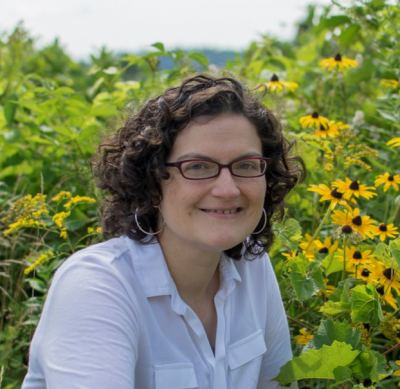 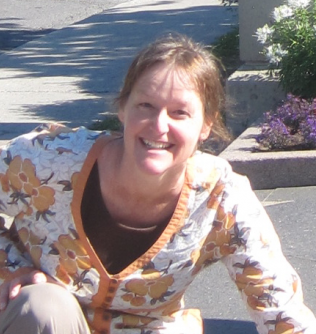
From left to right: Carrie Diaz Eaton (Director of QUBES Consortium) and Kristin Jenkins (Director of BioQUEST)
Do you have a question about QUBES or something to share with the QUBES community? Drop an email to qubeshub@gmail.com and we will get right back to you.
Writing a proposal for an education project? Learn how the QUBES infrastructure can support your project.
The QUBES project has a comprehensive project support infrastructure, built by and for STEM educators, it addresses many of the challenges faced by education reform projects. Please visit our Services page to learn more about how QUBES can be used to support education projects or send email to qubeshub@gmail.com.
As a group of biology teachers and educational reformers our primary approach to providing resources and services involves creating opportunities for faculty to adopt a scholarly approach to teaching. That means that the QUBES platform is designed to help us do the work we need to do more efficiently, share it with others, and track its impact. This infrastructure can be adopted and customized by projects, communities, and working groups to help organize your participants, disseminate your products, collaborate with experts, and collect data for evaluation and research.
QUBES can be used as a meeting support site helping with recruitment, reaching a broader audience, and generating persistent products. See for example:
QUBES can be used as web-based, working space for you project where you can build a collaborative community and disseminate information about your work. See for example:
Many groups that already have a web presence keep a site on QUBES that acts as a portal to their materials and helps them connect with and raise awareness within the broader QUBES community. See for example:
Learn more about how QUBES can support your project on our Services page. If you have questions, feel free to contact Carrie Diaz Eaton, the Director of QUBES Alliance, at cdeaton “at” bates.edu.
Browse some of the biology education projects who use the QUBES infrastructure to collaborate and share.
If you have an existing project, visit the QUBES Support Community for Partner Projects, which is a space where QUBES Partner Projects can learn how to take full advantage of the QUBES infrastructure to achieve their goals, and don’t forget to join the group!

Cohort 4 Biology Teaching Assistant Project (BioTAP) Scholar applications are LIVE!
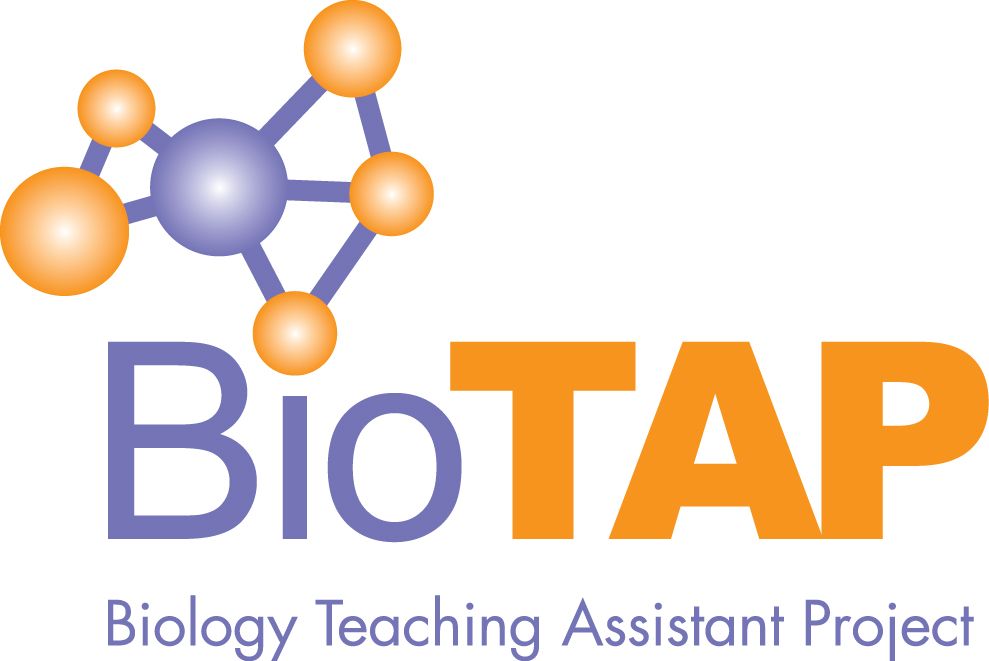
The Biology Teaching Assistant Project (BioTAP) is very pleased to announce that the application for Cohort 4 of the BioTAP Scholars program is now live on the BioTAP website (due January 24, 2020). BioTAP Scholars will work together over the 2020-2021 academic year to conduct research on biology GTA teaching professional development (TPD). By working together as a network, we intend to generate new evidence to inform recommendations for the improvement of biology GTA TPD. All are invited to apply and no research experience is necessary. The application page of the BioTAP website provides additional information about this program, but if you have other questions, contact Beth Schussler (eschussl@utk.edu).
If you want an idea of what research might result from the program, you can check out the recent BioTAP Conference and the BioTAP Scholars Cohort page at biotap.utk.edu.
Cohort 4 will be selected in February 2020, and will meet as a group May 27-29, 2020, at The Ohio State University in Columbus, OH.
Please spread the word to those you think would be interested in this opportunity.
Sincerely,
Beth Schussler, University of Tennessee
Grant Gardner, Middle Tennessee State University
Gili Marbach-Ad, University of Maryland
Kristen Miller, University of Georgia
Judith Ridgway, Ohio State University
Contribute to the 2020 ASMCUE Program!

The ASM Conference for Undergraduate Educators (ASMCUE) is driven by, for and with educators just like you! Undergraduate microbiology and biology educators attend this conference to share teaching strategies, brainstorm solutions for common classroom challenges and collaborate with colleagues. Regardless of your professional level, you will leave the conference with renewed inspiration for your work.
2020 ASMCUE will be held July 9-12, 2020, in Bellevue, WA, and we are inviting you to contribute to the program! The Program Committee is seeking your innovative ideas and research for sessions, poster abstracts, and more! Explore some of the ways you can get involved:
Session Proposals Have an idea for an exciting and interactive session at ASMCUE? Submit your proposal for a pre-conference workshop or education session! Get the details and plan to share your knowledge! Hint: The Planning Committee is particularly interested in topics for today’s classrooms, such as teaching practices for Generation Z/iGen, mindfulness practices, achieving an anti-racist education, and resilience for educators. Deadline: February 15, 2020, 11:59 p.m. PT
Poster Abstracts Share your recent research on education outcomes in the biological sciences with your peers. Abstracts should not discuss scientific content. Submit your abstract today. Deadline: February 15, 2020, 11:59 p.m. PT
Microbrews Want to field test a new idea and get feedback from your peers? Microbrews are short, interactive talks on your "brewing idea." Take advantage of having your peers all in one place and submit your ideas! Deadline: March 31, 2020, 11:59 p.m. PT
Travel Awards available! ASMCUE offers many travel awards to offset the cost of attendance - Apply now! Deadline: March 15, 2020, 11:59 p.m. PT
ASMCUE is your meeting, your way. Plan now to join us in Bellevue for four days of interactive learning, sharing, and connecting!
Questions? asmcue@asmusa.org | Learn more: asmcue.org.
Come to Open Science Skills Training in 2020.
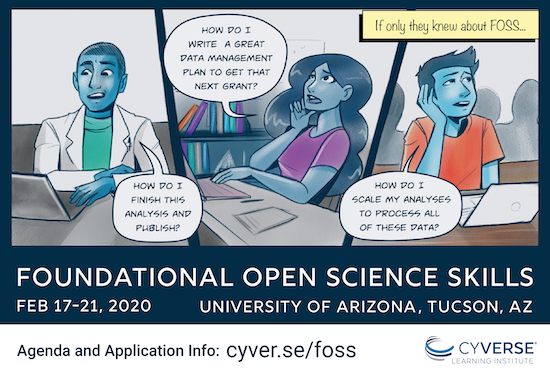
Apply Now!
What you will learn:
-
Open science resources for managing rigorous, reproducible research
-
Cloud, HPC, and other computing technologies for scaling analyses
-
Metadata management to comply with FAIR data standards
-
Creating and nurturing an open science culture in your collaborations
-
Writing and implementing great data management plans for granting agencies
More Info and Agenda
Save the date for the 2020 HITS summer workshop at UNC-Chapel Hill, June 1-3, 2020.
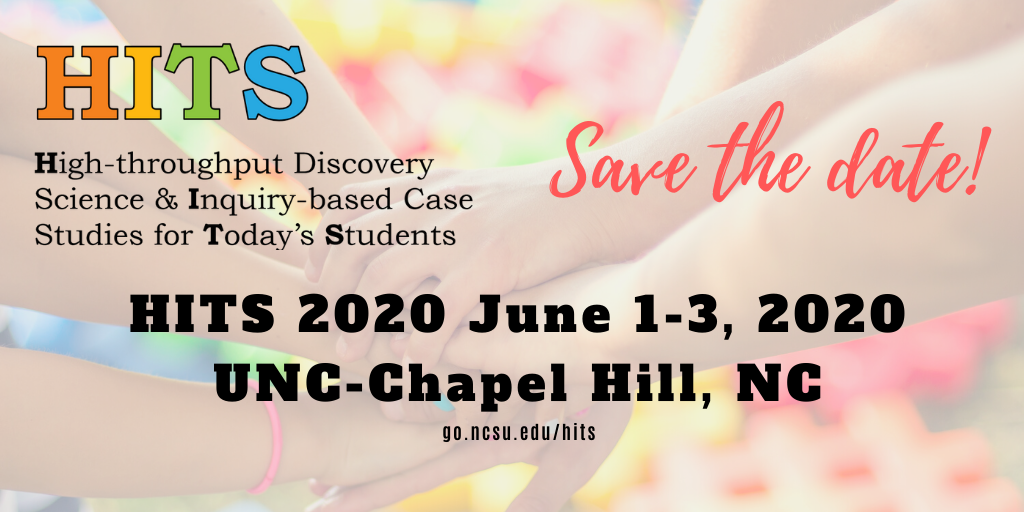
High-throughput Discovery Science & Inquiry-based Case Studies for Today’s Students (HITS) is an NSF RCN-UBE that seeks to improve student quantitative skills and participation in high-throughput discovery. HITS is excited to announce the dates and location for their next HITS workshop. The University of North Carolina at Chapel Hill will host the HITS group for our third summer workshop on June 1-3, 2020. The workshop will include a lineup of case study experts and high-throughput researchers and hands-on experience with cases in development. Please save the date so that you can attend!
HITS is also accepting applications for HITS Case Fellows! The effective design, implementation, and analysis of high-throughput (HT) research require fundamental quantitative skills. HITS seeks to improve student quantitative skills and participation in high-throughput discovery by creating novel case studies that demystify HT approaches and promote discovery science to reinforce cornerstone STEM concepts and quantitative skills in the college classroom. Faculty and postdoctoral fellows devoted to the use of case studies and problem-based learning pedagogies are encouraged to apply to become HITS Case Fellows. Apply by February 14th, 2019. Learn more and apply here.
Serve as an NSF IUSE Reviewer!
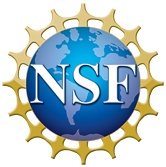
Want to serve as an NSF IUSE Reviewer?
The National Science Foundation’s (NSF) Division of Undergraduate Education is looking for reviewers for the Improving Undergraduate STEM Education (IUSE) Program. Reviewing is a great way to simultaneously learn more about the IUSE Program and contribute to the merit review process. This is the process through which submissions to the IUSE program are evaluated. Panels will be both virtual or in-person and occur in the Winter, Spring, and Fall.
Volunteer Now!

Job Opportunity: Inclusive science post-doc position at the University of Missouri, Columbia

The THRIVE project invites applications for a full-time postdoctoral scholar to contribute to inclusive excellence research and activities in higher education. The initial appointment will begin by fall of 2020 and could extend for two years. Please note that a part-time position is also available. The scholar will work with Dr. Marcelle A. Siegel (PI), as well as Asst. Professor of Identity and Justice in STEM Education, Terrell Morton (Co-PI), Professor of Biology, Johannes Schul (Co-PI), and Professor of Natural Resources, Charlie Nilon (Co-PI).
THRIVE is in its second year of a five-year project aimed to transform instructional, institutional, and undergraduate experiences for new majority students across the natural sciences through intensive community building, deconstructing, and partnering efforts. The vision is to disrupt current practices, attitudes, and structural barriers and create a campus environment in which students truly thrive. We aim to develop a culture of inclusive excellence, meaning the practice of extending a quality education to all students, the culture of welcoming students to belong in academic communities, and the act of empowering participants in the practice of science.
Learn more about this job opportunity.
Apply for the HHMI BioInteractive Ambassador Academy.

HHMI BioInteractive is inviting educators to participate in a 3-year professional development Academy that will grow the Ambassador community. Educators from all identity groups and educational contexts are welcome to apply. Up to 30 educators will be selected to work with BioInteractive to spread inclusive and equitable science teaching practices that incorporate our classroom resources, approach, and values.
Participants in this Academy will engage in a research-based professional development pathway focused on building professional learning leadership capacity.
Benefits of participation in the Academy include:
-
Up to 3 years of professional learning and development
-
Full travel and registration support to participate in NABT during year 1 and 2
-
Participation in a national professional network of expert life science educators
-
Full travel and registration, coaching support and $1000 stipend to present at least once at a national and/or regional meeting in year 3
Upon completion of the three-year Academy, cohort members will join the HHMI BioInteractive Ambassador community and help to design and facilitate BioInteractive professional learning experiences for other educators, serve as program advisors, and contribute to BioInteractive content as developers, reviewers, and field testers.
To be eligible, potential participants should be full-time biology or environmental science educators who teach high school or undergraduate students as part of their professional responsibilities and work in the US, US territories, Mexico or Canada.
More more details about the program, and application instructions are available at https://www.biointeractive.org/ambassador-community
To participate in this exciting professional development opportunity, you must indicate your intent to apply by January 6, 2020.
Pilot test BLAST, Genome Browser, or RNA-Seq lessons from the Genomics Education Alliance (GEA).
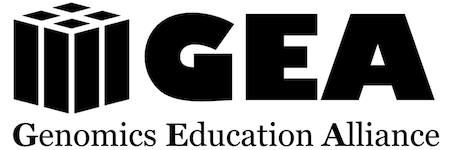
The Genomics Education Alliance (GEA) represents a group of life science educators who have experience engaging students in Course-based Undergraduate Research Experiences (CUREs) in genomics and bioinformatics. GEA is now recruiting faculty to pilot a set of stand-alone lessons meant to support CUREs in three areas: lessons on examining gene sequence similarities using BLAST, understanding eukaryotic gene structure by using a genome browser, and investigating gene expression by using basic tools for RNA-seq analysis. Click here to learn more about these lessons and to sign up for this pilot.
Do you have a product or result from a QUBES sponsored activity? Help us measure our success by sharing your product or result with QUBES. Learn how to cite QUBES.
|